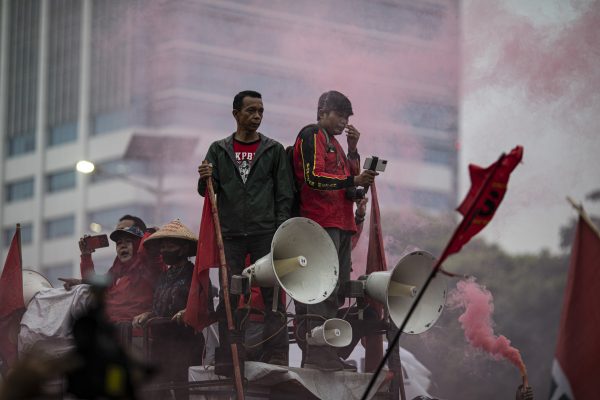With this announcement, it is almost certain — almost, as anything could still happen in Indonesian politics — that the next elections will take place in February 2024. These will be simultaneous parliamentary, senate and presidential elections but, as in 2019, the latter will likely be most important for voters.
Although 2024 is still two years away, speculation has begun on who might replace Jokowi. Surveys indicate that the president is still popular, considered successful in infrastructure development and COVID-19 pandemic economic recovery. Normally incumbents would try to field a candidate who would continue their legacy, but Jokowi does not have his own party and so will not get to choose a successor. The political battleground itself will likely shift as parties form new coalitions following the candidates they endorse.
The polls so far indicate that Central Java Governor Ganjar Pranowo, Defence Minister Prabowo Subianto and Jakarta Governor Anies Baswedan are most likely to be endorsed as presidential candidates. Meanwhile, State-Owned Enterprises (SOE) Minister Erick Thohir, Tourism and Creative Economy Minister Sandiaga Uno, West Java Governor Ridwan Kamil, Democrat Party Chairman Agus Harimurti Yudhoyono and Parliament Speaker Puan Maharani — daughter of the Indonesian Democratic Party for Struggle (PDI-P) Chair Megawati Sukarnoputri — are popular vice-presidential candidates.
A recent election simulation by pollster Charta Politika indicated Ganjar Pranowo as the most popular choice regardless of his running-mate. The second most popular figure was Prabowo Subianto.
As the only party in the 2019 elections to have won the required 20 per cent of legislative votes to be allowed to unilaterally nominate a presidential ticket in 2024, PDI-P is alone in not being obligated to form a nominating coalition with other parties. Megawati will likely propose a figure with a similar policy stance to Jokowi, perhaps pairing the candidate with her daughter, Puan Maharani, as the vice-presidential candidate. Some speculate that PDI-P will support Ganjar Pranowo as he, like Jokowi, is Javanese, religiously tolerant and has a focus on effective governance. But Ganjar is a long-time PDI-P cadre and an all-PDI-P ticket of Ganjar–Puan could limit the ticket’s appeal to the party’s base.
To increase its candidate’s chances, PDI-P may still form a coalition and either not endorse Ganjar or abandon Puan to accommodate the other party’s preferences. Recent news indicates tussles between Ganjar and Central Java’s PDI-P leadership, which suggests they may not support his candidacy. But others point out Megawati’s fundamental interest in maintaining PDI-P as Indonesia’s ‘kingmaker’, and for this she will likely endorse Ganjar as the most popular candidate.
A ticket comprising Ganjar and SOE minister Erick Thohir is one viable option. A highly successful young entrepreneur, Erick is popular among millennial voters. As an honorary member of the Multipurpose Ansor Front, the militia wing of the youth organisation Ansor — which is affiliated with the Nahdlatul Ulama, Indonesia’s largest moderate Muslim organisation — Erick could attract moderate Muslim votes.
Others predict a Prabowo Subianto–Puan Maharani ticket. Having run for president in 2014 and 2019, and as Megawati’s vice-presidential candidate in 2009, Prabowo remains popular. Although Prabowo’s party opposed Megawati’s PDI-P in both 2014 and 2019, the fact that he had earlier run with Megawati and now serves as defence minister in the PDI-P-supported government shows that the two figures are not fundamentally opposed.
The opposition camp might field Jakarta Governor Anies Baswedan, mostly for his popularity among conservative Islamic voters. But it is unclear if this voting bloc is as strong as in 2019 after recent government moves, such as banning the firebrand Islamic Defenders Front (FPI). He will likely still need some votes from the moderate Muslims, yet this is difficult due to his conservative image. Since Anies’ candidacy in the 2017 Jakarta election was supported by Prabowo, the possibility of Prabowo and Anies running head-to-head in 2024 illustrates the flexibility of Indonesia’s politics. The relative absence of party ideology has made individual candidates — and public perception of their ‘religiosity’ — the focus of mobilisation.
A possible dark horse is General Andika Perkasa, Commander of the Armed Forces. Appointed in November 2021, Andika— the son-in-law of the influential former intelligence chief Hendropriyono, has unusual policies. Recently he allowed descendants of members of the long-disbanded Indonesian Communist Party (PKI) to apply to the armed forces. They had been barred since 1966 and Andika’s decision attracted controversy. But observers highlight the potential support of 25 million PKI descendants. Even if they do not form a voting bloc, Andika’s decision to let this group join the military will resonate with supporters of ‘national reconciliation’.
Political developments over the next two years are sure to bring some surprises. It remains to be seen whether identity politics, the success in managing the COVID-19 or other new political issues will dictate preferences in 2024.
Deasy Simandjuntak is Associate Fellow in Indonesia Studies Programme at the ISEAS-Yusof Ishak Institute, Singapore, Adjunct Associate Professor at National Chengchi University, Taipei and International Visiting Fellow at Taiwan Foundation for Democracy, Taipei.

